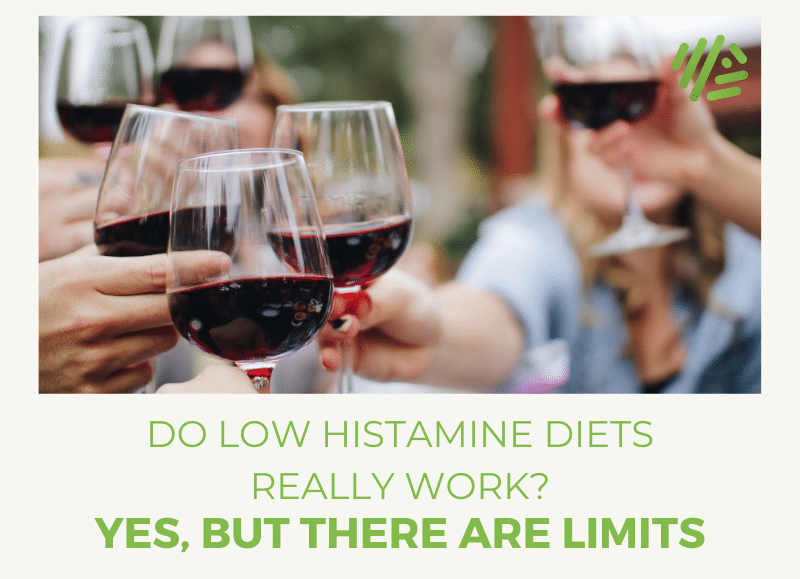Do Low Histamine Diets Really Work? Yes, But There are Limits
Genes Mentioned

Contents
The histamine bucket
If you’re reading this post, you’ve probably been introduced to the concept of the “histamine bucket,” the idea that we only have so much histamine we can clear from our systems, and when the histamine spigot goes into fire hose mode symptoms pop up as histamine begins to pool. One of the factors that contributes to filling the histamine bucket is allergy. That’s right, the air we breathe impacts our immune system and how it subsequently reacts to food. Mold illness is another one. Foundational triggers like mold, gut issues, and allergy can set the table for histamine intolerance by putting the immune system on a state of high alert. If you’re interested in the primary factors that give rise to histamine intolerance, check out this post. However, if you’ve already determined histamine could be an issue for you and are Googling everywhere for whether a given food is “high histamine,” here is your permission to stop.. Stop, because strict low histamine diets don’t work for most people. Especially when those people are crafting their own diets and analyzing how every bite of food they eat is affecting them. Here is the bottom line.100 “avoid” foods is not sustainable
Whether you have an issue with histamine or not, you are going to have to eat to be healthy. Exhaustive food lists detailing every food known to man as “high histamine” are not helpful. If the list stopped at dairy, cheese, red wine, and processed meat, that would be one thing. But spinach, banana, and avocado? Seems like a cruel joke. The fact is, most high histamine food lists contain many items that are nutrient rich and healthy as “foods to exclude.” Some people are unknowingly eating a very high histamine diet. Cutting out some of the obvious worst offenders, like cheese, condiments, and leftovers, can go a long way towards resolving their issues. Nonetheless, most of the blogosphere hyper focuses on high histamine food lists, which causes those of us trying to balance histamine levels to associate food with stress and to unnecessarily limit what we eat. Let me repeat: histamine issues or not, you’re going to have to eat. Stressing over over the decision of whether to eat a cherry or a dried apricot, actually causes an increase level of histamine to be realsed. 2 While many feel better by keeping an eye on, and limiting, dietary sources of histamine, a couple weeks of scouring high histamine food lists drives most of my clients crazy. I no longer use them, or reference them. I have a solid idea of which foods are highest in histamine, and which ones I don’t do well with, but I also understand that virtually all food contains some histamine. If you have an issue with histamine, and you try in earnest to keep it under control, eventually you will get a sense for which foods cause problems, and what you can get away with keeping in your diet.Allergy and low histamine diets
Although the evidence is still emerging and more research is needed, an allergy can play a role in histamine intolerance. To quote the excellent write up in the American Journal of Clinical Nutrition (ACJN), titled Histamine and Histamine Intolerance: Underlying conditions for increased availability may be an endogenous histamine overproduction caused by allergies, mastocytosis, bacterias, gastrointestinal bleeding, or increased exogenous ingestion of histidine or histamine by food or alcohol. Histamine overproduction caused by allergy. Consider that statement for a moment. The ACJN recognizes the accepted scientific fact that our body’s produce more histamine in response to allergic triggers. If you incorporate the bucket theory of histamine clearance, this could mean that those who suffer from histamine intolerance have a lower threshold for histamine rich foods in locations where they have severe allergies. The most severe histamine intolerances occur in places where they also have allergic triggers.Why zero histamine diets are so difficult
Because all foods have histamine, it can be almost impossible to get enough nutrients, and completely impossible to enjoy life, when eating a zero histamine diet. For example, if you’re going to Sonoma with friends and family, perhaps abstaining from wine is a good idea, but allowing yourself to enjoy vacation and eat out is also healthy (of course without overindulging in glutinous portions) . A good strategy for many is to remove “low value” histamine foods, i.e. foods that are high in histamine that they don’t enjoy all that much, and totally exclude the “obvious” histamine offenders like red wine, cheese, and all processed meat.Extreme diets are not sustainable
The implied consensus view when confronted with a histamine issue is to remove every last drop of histamine from your diet, and if you’re very sick, this may be necessary for a time. However, it might not be. You’ll have to learn what your body needs. Not everyone processes histamine in the same way. If you’re sensitive, being mindful of histamine is a good idea. However, viewing food as the enemy isn’t the solution. Viewing a laundry list of food as “bad” is not going to take you where you want to go. Diminished ability to deal with histamine, does not equal zero ability to deal with histamine. An extreme diet is not a sustainable option for almost anyone. How many really healthy people do you know who eat as if they are navigating a minefield? Don’t let histamine issues, or any other health project you’re working on, put your mind into a sickness mentality. Keep in mind that dietary histamine is only one factor that contributes to your overall histamine load. The idea is to eat smart and stay healthy, not to panic and start to fear your fridge. If you want to reduce histamine, there are plenty of places to do it besides the fridge.Can Low FODMAP work for histamine intolerance?
There is some evidence that they can. This study showed that individuals with histamine intolerance that followed a low FODMAP diet actually decreased their histamine levels by eightfold.A sample histamine protocol
There are a number of low histamine diet protocols to choose from, although I don’t usually recommend trying one without the help of a dietitian. For example, some people find value with the SIGHI program. More broadly, these are some simple diet and lifestyle tips that may help with histamine issues:- Meditation
- Yoga
- Limit caffeine
- No gluten
- Limit dairy, especially cow dairy
- Whole food, plant based diet 75% of the time
- Very little alcohol and totally cut out red wine
- Keep an eye on FODMAPS
- Never eat processed meat
- Almost never eat leftovers




What a great article. I am glad I found this when I did. I just fell down the “low histamine diet” rabbit hole. In less than 2 weeks trying the diet I have had a dramatic change in symptoms. But, I’m not willing to try and eliminate all histamine from my diet. For example, I love matcha and I drink it everyday and I will not give it up. I’ve been doing fine keeping it in my diet so far!
I really like your approach about keeping out the big offenders and not eating leftovers; that I something I can do long term. It’s not that hard to avoid gluten for me as I live in the PNW and gluten free options abound.
Thank you for your measured approach!
Thanks for reading and commenting Jessica! I agree that a balanced approach is the only way to sustain a diet lower in histamine.
Is there a list of foods to eat please
Hi John!
Just wanted to say I think this is one of the best things I’ve seen on the Internet regarding low histamine diet, so thank you! I came across this article as I was researching the latest info out there on the diet, and feel it is overdue for this to be written.
I have genetic DAO deficiency and do a low histamine regimen a time or two a year to clear the bucket but otherwise take a similar approach to you. I coach people who also have histamine issues and am always amazed at the people who have been on long term low histamine diets and have basically wrecked their guts by having virtually no diversity in their diets.
I really hope this approach becomes more common, and that doctors/other health professionals will warn their patients that a low histamine diet is not a viable long term solution.
Cheers to being a voice of reason out there!
Thanks for reading Meredith! And thanks for the kind words. I definitely see the value in reducing histamine for some people, but man, I’ve also seen so many people struggle with low histamine diets that I think it’s important to emphasize that all of us have to eat to be healthy. Having said that, I understand what it’s like to feel like you’re reactive to a ton of foods and to have that hesitation, so no judgment for readers who are on strict protocols.